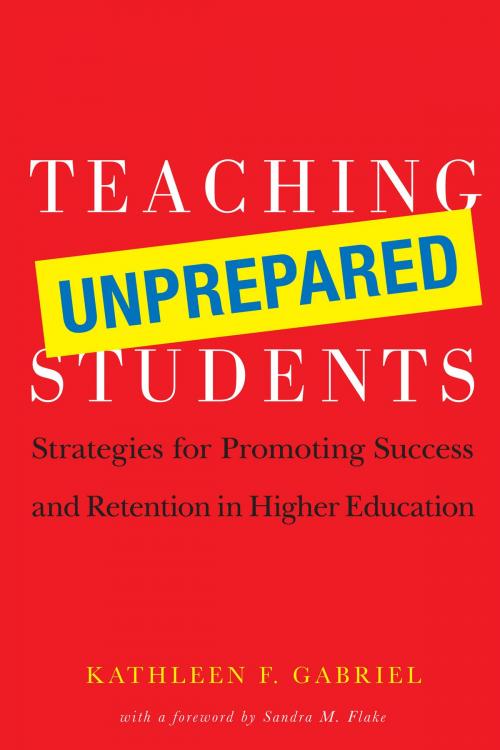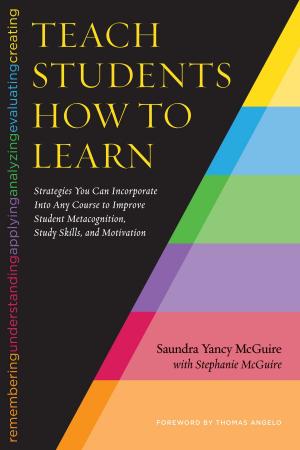Teaching Unprepared Students
Strategies for Promoting Success and Retention in Higher Education
Nonfiction, Reference & Language, Education & Teaching, Higher Education| Author: | Kathleen F. Gabriel | ISBN: | 9781620367957 |
| Publisher: | Stylus Publishing | Publication: | August 21, 2017 |
| Imprint: | Stylus Publishing | Language: | English |
| Author: | Kathleen F. Gabriel |
| ISBN: | 9781620367957 |
| Publisher: | Stylus Publishing |
| Publication: | August 21, 2017 |
| Imprint: | Stylus Publishing |
| Language: | English |
As societal expectations about attending college have grown, professors report increasing numbers of students who are unprepared for the rigors of postsecondary education—not just more students with learning disabilities (whose numbers have more than tripled), but students (with and without special admission status) who are academically at-risk because of inadequate reading, writing and study skills.
This book provides professors and their graduate teaching assistants—those at the front line of interactions with students—with techniques and approaches they can use in class to help at-risk students raise their skills so that they can successfully complete their studies.
The author shares proven practices that will not only engage all students in a class, but also create the conditions—while maintaining high standards and high expectations—to enable at-risk and under-prepared students to develop academically and graduate with good grades. The author also explains how to work effectively with academic support units on campus.
Within the framework of identifying those students who need help, establishing a rapport with them, adopting inclusive teaching strategies, and offering appropriate guidance, the book presents the theory teachers will need, and effective classroom strategies.
The author covers teaching philosophy and goals; issues of discipline and behavior; motivation and making expectations explicit; classroom climate and learning styles; developing time management and study skills; as well as the application of “universal design” strategies.
The ideas presented here—that the author has successfully employed over many years—can be easily integrated into any class.
This book provides professors and their graduate teaching assistants—those at the front line of interactions with students—with techniques and approaches they can use in class to help at-risk students raise their skills so that they can successfully complete their studies.
The author shares proven practices that will not only engage all students in a class, but also create the conditions—while maintaining high standards and high expectations—to enable at-risk and under-prepared students to develop academically and graduate with good grades. The author also explains how to work effectively with academic support units on campus.
Within the framework of identifying those students who need help, establishing a rapport with them, adopting inclusive teaching strategies, and offering appropriate guidance, the book presents the theory teachers will need, and effective classroom strategies.
The author covers teaching philosophy and goals; issues of discipline and behavior; motivation and making expectations explicit; classroom climate and learning styles; developing time management and study skills; as well as the application of “universal design” strategies.
The ideas presented here—that the author has successfully employed over many years—can be easily integrated into any class.
As societal expectations about attending college have grown, professors report increasing numbers of students who are unprepared for the rigors of postsecondary education—not just more students with learning disabilities (whose numbers have more than tripled), but students (with and without special admission status) who are academically at-risk because of inadequate reading, writing and study skills.
This book provides professors and their graduate teaching assistants—those at the front line of interactions with students—with techniques and approaches they can use in class to help at-risk students raise their skills so that they can successfully complete their studies.
The author shares proven practices that will not only engage all students in a class, but also create the conditions—while maintaining high standards and high expectations—to enable at-risk and under-prepared students to develop academically and graduate with good grades. The author also explains how to work effectively with academic support units on campus.
Within the framework of identifying those students who need help, establishing a rapport with them, adopting inclusive teaching strategies, and offering appropriate guidance, the book presents the theory teachers will need, and effective classroom strategies.
The author covers teaching philosophy and goals; issues of discipline and behavior; motivation and making expectations explicit; classroom climate and learning styles; developing time management and study skills; as well as the application of “universal design” strategies.
The ideas presented here—that the author has successfully employed over many years—can be easily integrated into any class.
This book provides professors and their graduate teaching assistants—those at the front line of interactions with students—with techniques and approaches they can use in class to help at-risk students raise their skills so that they can successfully complete their studies.
The author shares proven practices that will not only engage all students in a class, but also create the conditions—while maintaining high standards and high expectations—to enable at-risk and under-prepared students to develop academically and graduate with good grades. The author also explains how to work effectively with academic support units on campus.
Within the framework of identifying those students who need help, establishing a rapport with them, adopting inclusive teaching strategies, and offering appropriate guidance, the book presents the theory teachers will need, and effective classroom strategies.
The author covers teaching philosophy and goals; issues of discipline and behavior; motivation and making expectations explicit; classroom climate and learning styles; developing time management and study skills; as well as the application of “universal design” strategies.
The ideas presented here—that the author has successfully employed over many years—can be easily integrated into any class.















